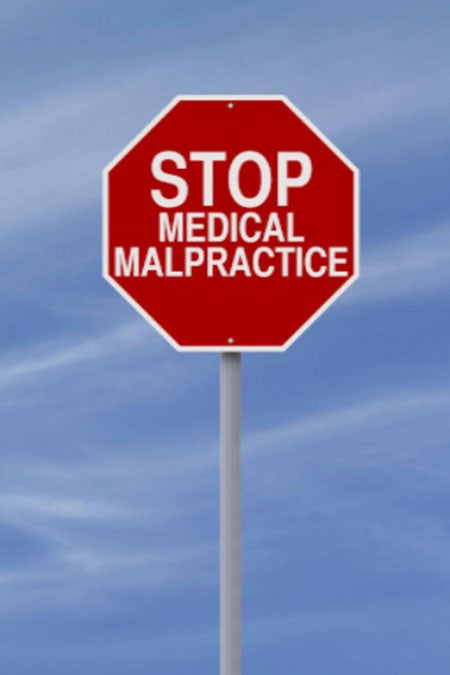Medical Malpractice Death Statistics
Behind the Numbers: Medical Malpractice Death Statistics
Preventable Medical Errors Are Now the Third Leading Cause of Death in the United States
You are sick or in serious pain and nothing can seem to ease your discomfort. Feeling helpless, you choose to head to the closest emergency room or call 911 to rush you there.
You should feel relief that once you reach your destination, a qualified doctor and skilled medical staff can help diagnose and treat whatever is causing you such serious illness.
Unfortunately, the latest statistics on medical negligence have patients wondering if they are actually safe in the hospital or if they're literally risking their life?
The Legal Examiner defines negligence as "doing something that a reasonably prudent person in a given situation wouldn't do, or not doing something that a reasonably prudent person would do in that situation." In the case of medical malpractice, negligence can be determined based on examining whether the doctor or primary care provider delivered "reasonable care" to the patient on the same level that another physician might.
More Deadly Than Strokes, Accidents and Alzheimer's Disease
According to a 2016 study led by Martin Makary, a professor of surgery at the Johns Hopkins University School of Medicine, medical errors in hospitals and other health care facilities are so commonplace that preventable deaths due to medical malpractice are the third leading cause of death in the United States. Their latest estimate found that approximately 251,000 lives are claimed each year because of medical error - about 9.5 percent of all deaths annually in the United States. This staggering number is higher than deaths caused by stroke, accidents or Alzheimer's.
In order to reach this number, the researchers only included patients who died as a direct result of inferior medical treatment – not those who died due to their condition despite good medical care or from illness with no known viable treatment option.
"It boils down to people dying from the care that they receive rather than the disease for which they are seeking care," Markay says.

Preventable Medical Errors – An American Epidemic
Markay's research isn't the first report to shock the medical community. A similar study conducted back in 1999 by the Institute of Medicine, called the "To Err is Human" report, concluded that as many as 98,000 deaths per year occurred due to errors in the industry. Researchers wrote, "Errors...are costly in terms of loss of trust in the health care system by patients and diminished satisfaction by both patients and health professionals."
This study went so far as to say that preventable medical errors were becoming an epidemic in the United States.
A Grieving Father's Medical Malpractice Study
Yet again, the prevalence of medical negligence came to light when in 2013 (three years before Markay's study) the Journal of Patient Safety estimated that the actual number of yearly fatalities caused by medical malpractice ranges between 210,000 and 440,000. John T. James, a toxicologist at the NASA Space Center in Houston, Texas, calculated the higher estimates by researching the total number of hospital deaths after his 19-year-old son passed away due to hospital negligence. James went on to found an advocacy organization called Patient Safety America.
James' study was slightly different from the 1999 and 2016 studies. He examined the records of over 4,200 patients between the years of 2002 to 2008. After conducting this research, he determined that 21 percent had received some sort of negative treatment. In 1.4 percent, he found deadly events that occurred. James then added these findings together and extrapolated the data across 34 million hospitalizations that occurred in 2007. His results estimated that preventable error contributed to around 210,000 patient deaths per year. This is close in line with the latest Markay study estimating 251,000 fatalities.
These findings serve as a baseline. It is believed the more accurate number is twice as high because not all errors can be caught—specifically such errors where treatment wasn't given and should have been. If the 440,000 estimation is correct, this number would equal 1/6 of the total number of deaths that occur each year in the U.S.
What's the Right Number?
While the exact numbers will never be known due to some cases never being reported and other variables, the estimates clearly indicate an epidemic problem in the American health care system. Hundreds of people are killed each day because of medical errors in hospitals and facilities across our nation. We can only imagine how many more are living with lifelong injuries sustained from poor medical treatment.
Nobody knows for sure how many people die due to medical malpractice because there has never been an actual count of the number of patients who experience preventable harm. This leaves us with estimates like James' and Makary's, which are imperfect. There are too many inaccuracies in medical records and some providers are reluctant to report mistakes.
Many believe that the U.S. Centers for Disease Control & Prevention should be required to change their reporting standards. Currently, the CDC is not required to report medical errors in the data it collects for their billing codes, making it difficult to size up the true severity of the issue nationally. Advocates like James and Makary are fighting to make it mandatory for the CDC to report any error that led to a patient's death.
Regardless what number is correct, measuring the problem is important because it brings awareness and research dollars to public health problems.
You're Not Alone
Does this information surprise or shock you? It should. The realization that an estimated 700 preventable deaths per day happen because of medical negligence, including poor communication or untrained doctors, is frightening.
If you have been injured at the hands of a negligent medical provider or a loved one has passed away due to what you believe to be medical negligence, contact an experienced medical malpractice lawyer at Tennessee's Gilreath & Associates to discuss your case.
